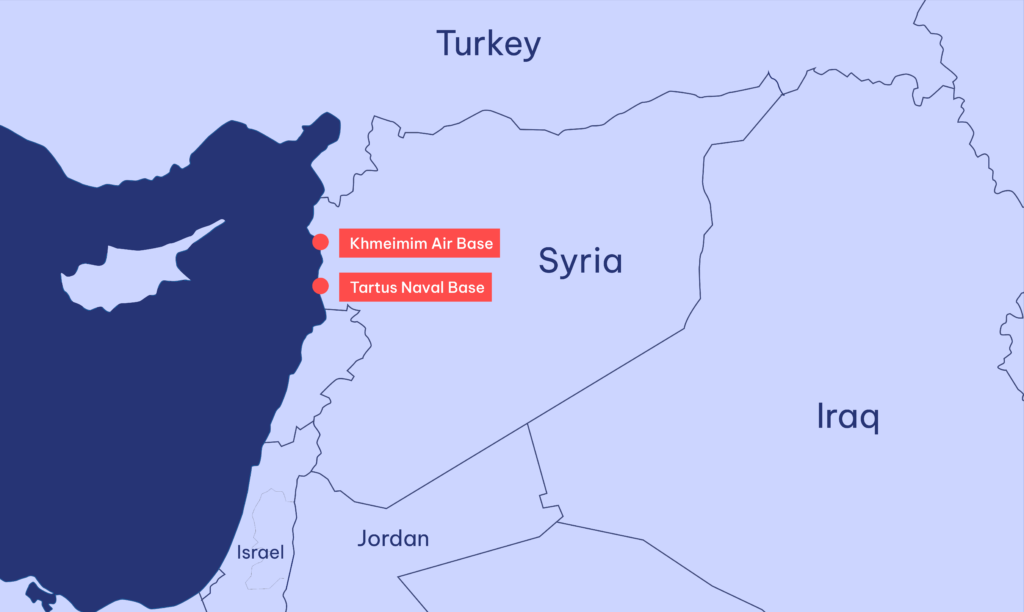On July 31, Syrian Foreign Minister Asa’ad al-Shaibani met with Russian President Vladimir Putin in Moscow, the same city where deposed President Bashar al-Asad now lives in exile. Shaibani was carrying an unexpected request. According to sources familiar with the meeting, Damascus asked Russia to resume military police patrols along Syria’s southern border with Israel. The reasoning was stark: “Russia’s return to its previous positions could prevent Israel’s interference in Syrian affairs.”
This overture represents a remarkable diplomatic reversal. Just months earlier, Russia had abandoned Asad with surprising ease. Today Moscow finds itself courted by the very rebels it once branded as “bloody al-Qa’ida terrorists.” Putin invited the interim Syrian president, Ahmed al-Shara’a (formerly known by the nom de guerre Abu Muhammad al-Jolani), to a Russia-Arab summit scheduled to be held in Moscow on October 15. Syria in turn has contracted with Russian firms to print Syria’s new currency, the first Syrian banknote in decades that won’t have an Asad family member’s portrait.
Both Moscow and Damascus have compelling reasons to reset their relationship, reasons that extend far beyond their shared animosity toward Western influence.
The Logic of Russian Pragmatism
Swift recognition of Syria’s new government reflects a Russian cold-eyed pragmatism that includes counter-terrorism policy. ISIS and the Muslim Brotherhood are on Russia’s terrorism list, but Hamas and Hizbullah are not. The Taliban, who regained control of Afghanistan, were removed from the list. Hayat Tahrir al-Sham, al-Shara’a’s organization, technically remains designated as a terrorism organization yet this classification has not prevented Moscow from pursuing diplomatic ties with Damascus.
This pragmatic flexibility stems from Russia’s unchanged strategic imperatives in the region. Despite the Ukraine war’s enormous demands on Russian resources, Moscow is not willing to abandon its Middle Eastern foothold. The Mediterranean naval base at Tartus and the Khmeimim airbase remain vital for projecting Russian influence not only across the Levant but throughout Africa, serving as an airbridge for Russian operations from Libya to the Central African Republic.

Moreover, Russia faces a new strategic challenge: containing Turkish regional expansion. Ankara’s growing influence in Syria directly threatens Russian interests, making the new government in Damascus a natural, if unlikely, partner in this regional balance-of-power game.
Syria’s Strategic Calculus
Syria’s outreach to Moscow may appear counterintuitive given the influx of Gulf investment and the lifting of Western sanctions. Multibillion-dollar reconstruction deals with Saudi Arabia and Qatar promise a prosperous future, while normalized relations with much of the international community offer opportunities for economic recovery.
Yet Syria’s new leadership faces immediate challenges that wealthy Gulf partners cannot easily address. Food security remains precarious following years of drought and conflict. The country needs military equipment to rebuild its armed forces and fight ISIS cells. Perhaps most critically, Syria requires counterweights to its powerful neighbors, Turkey and Israel, both of whom have since Asad’s fall expanded their presence on Syrian soil.
Russia’s grain shipments, while controversial (reports suggest some may be stolen Ukrainian wheat), have provided crucial food security. Moscow resumed these deliveries in April as a “one-time gesture,” but subsequent shipments suggest a more systematic arrangement. For a country where 16 million people face food insecurity, such assistance carries significant political weight.
The Unlikely Israeli Connection
An intriguing aspect of this triangular relationship involves Israel’s role in preserving Russian influence in Syria. Reuters reported in March that Israeli officials have quietly lobbied Washington to maintain Russian military bases in Syria, viewing Moscow as a preferable alternative to expanded Turkish control along Israel’s northern border.
This convergence of interests creates a delicate balance. While Russia publicly condemns Israeli airstrikes on Syrian territory as violations of sovereignty, both Moscow and Jerusalem share concerns about Syria’s internal stability. During recent sectarian violence in southern Syria that killed thousands of Alawites, Druze and Sunnis, both Russian and Israeli officials and media heavily criticized Damascus’s handling of the crisis.
Russia’s ambassador to Israel Alexander Viktorov recently acknowledged this complex relationship, in a public comment following discussions between Netanyahu and Putin regarding Syria. Viktorov noted that “the stabilization of Syria will contribute to improving the situation throughout the entire Middle East region. Such a development fully corresponds to the fundamental interests of both Russia and Israel.”
Moscow’s Insurance Policies
Russia’s re-engagement with Damascus extends beyond official channels. Moscow maintains ties with traditional Syrian allies, particularly the Alawite community that formed the Asad family’s political base. These relationships provide potential leverage should negotiations with the al-Shara’a government deteriorate.
Currently, Russia awaits Syria’s nomination of officials to head an interministerial committee tasked with reviewing all previous bilateral agreements. While Moscow’s primary objective remains securing its naval and air bases in Syria, any arrangement will likely come with a price tag, such as renewal of Russian patrols in sensitive areas, such as the Golan Heights border or the Qamishli area in Syria’s northeast.
This emerging Russian-Syrian partnership faces significant constraints. The al-Shara’a government must balance competing regional pressures while establishing legitimacy both domestically and internationally. Too close an association with Moscow risks alienating Western partners crucial for reconstruction financing. Meanwhile, Russia’s capacity to project power in Syria remains limited by Ukraine war demands that depleted its financial and military resources.
Implications for Regional Order
Russia’s calibrated return to Syria reflects a fundamental reality of contemporary Middle Eastern politics: even the most bitter enemies can find common ground when circumstances demand it.
For Syria, engaging Russia represents both an insurance policy against domination by neighbors and a hedge against over-dependence on any single patron. For Russia, maintaining Syrian influence provides crucial leverage in the Middle East.
The question remains whether this rapprochement can evolve into something more durable, in light of Russia’s limited resources and America’s simultaneous re-engagement in Syria. For now, Moscow appears determined to remain relevant in post-Asad Syria, even if it means embracing leaders it once sought to destroy.

